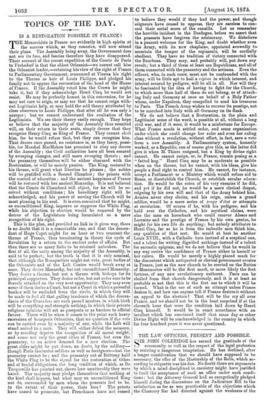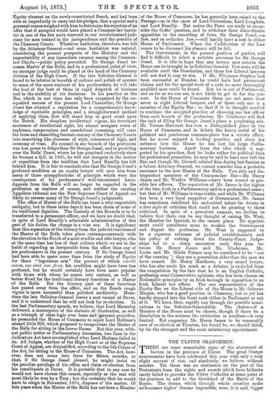THE LAW OFFICERS, PRESENT AND POSSIBLE.
SIR JOHN COLERIDGE has earned the gratitude of the community as well as the respect of the legal profession by resisting a dangerous temptation. He has declined, after a longer consideration that we should have supposed to be necessary, the offer of the Mastership of the Rolls, which ac- cording to etiquette was his due. No doubt there are arguments by which a mind disciplined in casuistry might have justified to itself the acceptance of such an office under such condi- tions; but the Attorney General had so energetically pledged himself during the discussions on the Judicature Bill to the satisfaction as far as was practicable of the objections which the Chancery Bar had directed against the weakness of the
Equity element on the newly-constituted Bench, and had been able so imperfectly to carry out his pledgee, that a special and a personal reason weighed with him to determine his rejection of an offer that if accepted would have placed a Common-law banis- ter in one of the few seats reserved in our revolutionised judi- ciary for men trained in the jurisprudence and the practice of the Chancery Courts. Whatever hesitation, therefore, was felt by the Attorney-General—and some hesitation was natural, considering the present prospects of the Ministry and the improbability of any immediate vacancy among the Common- law Chiefs,—public policy prevailed. Sir George Jessel be- comes Master of the Rolls, and in a professional point of view, no stronger judge could be placed at the head of the Chancery division of the High Court. If the late Solicitor-General is found to be inferior in breadth of culture and polish of manner to some of the more eminent of his predecessors, he will take the lead of the best of them in rapid despatch of business and in the stability of his decisions. In his practice at the Bar, which in our time has only been surpassed by the un- equalled success of the present Lord Chancellor, Sir George Jessel has attained a reputation for a comprehensive know- ledge of equitable principles, and a straightforward method of applying them, that will stand him in good stead upon the Bench. His sleepless intellectual vigour, his trenchant -acuteness of intellectual sight, his almost arrogant scorn of sophisms, compromises, and roundabout reasoning, will scare the loose and shambling forensic oratory of the Chancery Courts into something like closeness of style, coherence of logic, and economy of time. No counsel in any branch of the profession was less prone to delays than Sir George Jessel, and in presiding over the Rolls' Court, where he has practised exclusively since he became a Q.C. in 1865, he will not derogate in the matter -of expedition from the tradition that Lord Romilly has left behind him. It is fair to conclude also that Sir George Jessel's profound erudition as an equity lawyer will save him from many of those misapplications of principle which were the consequence of his predecessor's well-intentioned haste. Appeals from the Rolls will no longer be regarded in the profession as matters of course, and neither the existing Appellate tribunal nor the New Supreme Court of Appeal are likely to reverse many of Sir George Jessel's judgments.
The office of Master of the Rolls can boast a very respectable -antiquity, but in these latter days it has been shorn of some of its traditional dignities. The Custody of the Records is to be 'transferred to a permanent officer, and we have no doubt that, in spite of Lord Romilly's admirable administration of this part of his duties, the change is a wise one. It is significant that this separation of the literary from the judicial functions of the Master of the Rolls takes place contemporaneously with the elevation to the Bench of a most erudite and able lawyer, who at the same time has less of that culture which we are in the habit of regarding as inseparable from the office than any of his predecessors in the present century. If Sir George Jessel had been able to spare more time from the study of Equity for those "ingenuous arts" the pursuit of which emollit Jnores, nee sinit esse feros, his erudition might have been less profound, but he would certainly have been more popular with those with whom he comes into contact, as well as 'better fitted for the traditional literary functions of a Master of the Rolls. But the literary part of those functions .has passed away from the office, and on the Bench rough vigour is more successful than polished mediocrity. Mean- time the late Solicitor-General leaves a seat vacant at Dover, and it is understood that he will not look for re-election. In the last Parliamentary speech, we believe, that Lord Macaulay delivered, a masterpiece of the rhetoric of illustration, as well as a triumph of close logic over loose and ignorant prejudice, he persuaded the House of Commons to reject Lord Hotham's -absurd little Bill, which proposed to incapacitate the Master of the Rolls for sitting in the Lower House. But this year, with- out public notice or Parliamentary discussion, two lines in the -Judicature Act have accomplished what Lord Hotham failed to do. All Judges, whether of the High Court or of the Supreme Court of Appeal, are disqualified, according to the 9th Clause of the Act, for sitting in the House of Commons. The Act, how- ever, does not come into force for fifteen months, so that, if Sir George Jessel pleased, he might insist on the peculiar privilege of his office, and claim re-election from his constituents in Dover. It is probable that in any case he would not have chosen this course, especially as the seat will most likely be won by a Tory ; but the certainty that he would have to resign in November, 1874, disposes of the matter. Of late years when the Master of the Rolls has not been a Member
of the House of Commons, he has generally been raised to the Peerage—as in the cases of Lord Cottenham, Lord Langdale, and Lord Romilly. But unless the Peers are ready to recon- sider the Oaths' question, and to withdraw their discreditable opposition to the ennobling of Jews, Sir George Jessel, —a Jew, and an orthodox Jew,—will hardly have a seat in either House of Parliament. When the Codification of the Law comes to be discussed his absence will be felt.
The Government, in the present position of parties, will find it difficult to select a suitable successor for Sir George Jessel. It is idle to hope that any lawyer now outside the House can be brought in as Solicitor-General. Few Beats will be available until the Dissolution, and those few Liberal lawyers will not find it easy to win. If Mr. Fitzjames Stephen had been successful at Dundee, he would have had paramount claims, and for the special work of a code no more thoroughly qualified man could be found. But he is out of Parliament, and as far as we can see, is not likely to get in for the pre- sent. In the House of Commons there are not more than seven or eight Liberal lawyers, and of these only one is a member of the Equity Bar ; so that if it be thought needful to continue the accepted practice of choosing one law officer from each branch of the profession, Mr. Gladstone will find the task of filling Sir George Jessel's place a perplexing one. Mr. Vernon Harcourt has won a distinguished place in the House of Commons, and in debate the heavy metal of his polished and ponderous common-place has a certain effect. But he never enjoyed a leading practice, and since his entrance into the House he has lost his large Parlia- mentary business. Apart from the idea which is sug- gested by his speeches, that he looks rather for political than for professional promotion, he may be said to have now left the Bar, and though Mr. Disraeli saluted him during last Session as a future Attorney-General, we cannot consider him a probable successor to the new Master of the Rolls. Two able and dis- tinguished members of the Common-law Bar—Mr. Henry James and Mr. Watkin Williams—have been named as pos- sible law officers. The reputation of Mr. James is the higher of the two, both in a Parliamentary and in a professional sense ; but that of Mr. Williams is respectable, and while Mr. Williams has been a very loyal supporter of Government, Mr. James has sometimes exhibited his undoubted talent for debate in a free style of criticism that could not be pleasing to those criticised. In spite of a prevalent rumour, we decline to believe that there can be any thought of raising Mr. West, the Member for Ipswich, to the vacant place. No appoint- ment could contribute more to weaken the Government and disgust the profession. Mr. West is supposed to be a rigorous reformer of judicial establishments, and his policy of cutting down the County-Court Judge- ships led to a sharp encounter early this year be- tween Mr. Henry James and Mr. Gladstone. Mr. Locke and Mr. Hinde Palmer may be considered to be "out of the running "; they are a generation older than the men we have named. Mr. Henry Matthews, a very sound lawyer, who has also made his mark as a debater, is excluded from the competition by the fact that he is an English Catholic, professing semi-Conservative opinions, who has been chosen on Nationalist principles by an Irish borough in opposition to an
Irish Liberal law officer. The one representative of the Equity Bar on the Liberal side of the House is Mr. Osborne Morgan, who has a good practice in Chancery, but as yet has hardly stepped into the front rank either in Parliament or out of it. We have, then, rapidly run through the possible nomi- nations to the Solicitor-Generalship. The choice—if a Member of the House must be chosen, though if there be a dissolution in the autumn the restriction is needless—is very limited. But supposing Mr. Henry James to be reasonably sure of re-election at Taunton, his would be, we should think, by far the strongest and the most satisfactory appointment.































 Previous page
Previous page